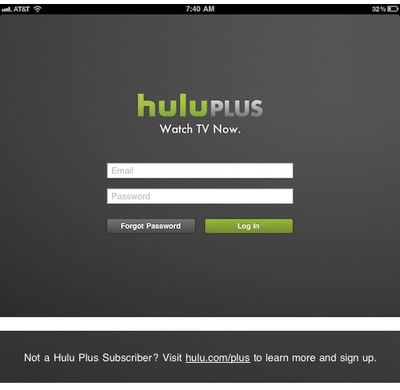Hulu Complies With Apple's New iOS In-App Subscription Rules Without Sharing Revenue
All Things Digital reports that in the latest update to its Hulu Plus application, television streaming company Hulu has brought itself into compliance with Apple's new In-App Subscription rules, taking advantage of a recent shift in Apple's stance to simply remove an external link to sign up for the paid service rather than offering subscriptions inside the application under a system in which Apple would take 30% of the revenue.
All Hulu had to do was strip out the link that sent potential subscribers to its Web site, because Apple's new rule will ban "apps that link to external mechanisms for purchases or subscriptions to be used in the app."
As initially deployed back in mid-February, Apple's In-App Subscription mechanism allowed publishers to set prices, but also required them to offer the same offers inside their applications as found through external mechanisms. Under the program, Apple would retain 30% of the revenue on subscriptions generated within the applications as a fee for bringing the subscriber to the service. The new terms were set to go into effect on June 30th for existing subscription-based applications, leading many to wonder how services such as Hulu and Netflix would deal with the requirements.

External subscription link text (bottom) removed from Hulu Plus login screen
But with Apple
reversing course earlier this month, those services now have a much easier path to compliance with Apple In-App Subscriptions terms. Under the revised terms, publishers with subscription programs are not required to also offer In App Subscriptions, provided that they do not link users to external purchasing mechanisms.
Consequently, apps like Hulu Plus can meet the requirements by simply having their subscription links removed from within the app. Hulu loses the benefit of direct link-outs for new subscribers, but does not have to offer In-App Subscriptions that would undoubtedly result in significant amounts of revenue being diverted to Apple. Users interested in subscribing to Hulu will simply have to visit Hulu's site on their own, manually entering the address or finding it through a search engine, in order to sign up.
All Things Digital notes that the solution adopted by Hulu is likely to make its way to a number of other prominent services such as Netflix and Rhapsody, although it is unclear how others such as Amazon's Kindle Store will be able to satisfactorily comply with the new rules going into effect next week without removing a significant convenience factor of being able to purchase individual e-books via link-outs from the app itself.
Popular Stories
Apple hasn't updated the AirPods Pro since 2022, and the earbuds are due for a refresh. We're counting on a new model this year, and we've seen several hints of new AirPods tucked away in Apple's code. Rumors suggest that Apple has some exciting new features planned that will make it worthwhile to upgrade to the latest model.
Subscribe to the MacRumors YouTube channel for more videos.
Heal...
Chase this week announced a series of new perks for its premium Sapphire Reserve credit card, and one of them is for a pair of Apple services.
Specifically, the credit card now offers complimentary annual subscriptions to Apple TV+ and Apple Music, a value of up to $250 per year.
If you are already paying for Apple TV+ and/or Apple Music directly through Apple, those subscriptions will...
Popular accessory maker Anker this month launched two separate recalls for its power banks, some of which may be a fire risk.
The first recall affects Anker PowerCore 10000 Power Banks sold between June 1, 2016 and December 31, 2022 in the United States. Anker says that these power banks have a "potential issue" with the battery inside, which can lead to overheating, melting of plastic...
In 2020, Apple added a digital car key feature to its Wallet app, allowing users to lock, unlock, and start a compatible vehicle with an iPhone or Apple Watch. The feature is currently offered by select automakers, including Audi, BMW, Hyundai, Kia, Genesis, Mercedes-Benz, Volvo, and a handful of others, and it is set to expand further.
During its WWDC 2025 keynote, Apple said that 13...
Apple's next-generation iPhone 17 Pro and iPhone 17 Pro Max are around three months away, and there are plenty of rumors about the devices.
Apple is expected to launch the iPhone 17, iPhone 17 Air, iPhone 17 Pro, and iPhone 17 Pro Max in September this year.
Below, we recap key changes rumored for the iPhone 17 Pro models:Aluminum frame: iPhone 17 Pro models are rumored to have an...
Apple last month announced the launch of CarPlay Ultra, the long-awaited next-generation version of its CarPlay software system for vehicles.
There was news this week about which automakers will and won't offer CarPlay Ultra, and we have provided an updated list below.
CarPlay Ultra is currently limited to newer Aston Martin vehicles in the U.S. and Canada. Fortunately, if you cannot...
Apple will finally deliver the Apple Watch Ultra 3 sometime this year, according to analyst Jeff Pu of GF Securities Hong Kong (via @jukanlosreve).
The analyst expects both the Apple Watch Series 11 and Apple Watch Ultra 3 to arrive this year (likely alongside the new iPhone 17 lineup, if previous launches are anything to go by), according to his latest product roadmap shared with...
Apple is planning to launch a low-cost MacBook powered by an iPhone chip, according to Apple analyst Ming-Chi Kuo.
In an article published on X, Kuo explained that the device will feature a 13-inch display and the A18 Pro chip, making it the first Mac powered by an iPhone chip. The A18 Pro chip debuted in the iPhone 16 Pro last year. To date, all Apple silicon Macs have contained M-series...





















